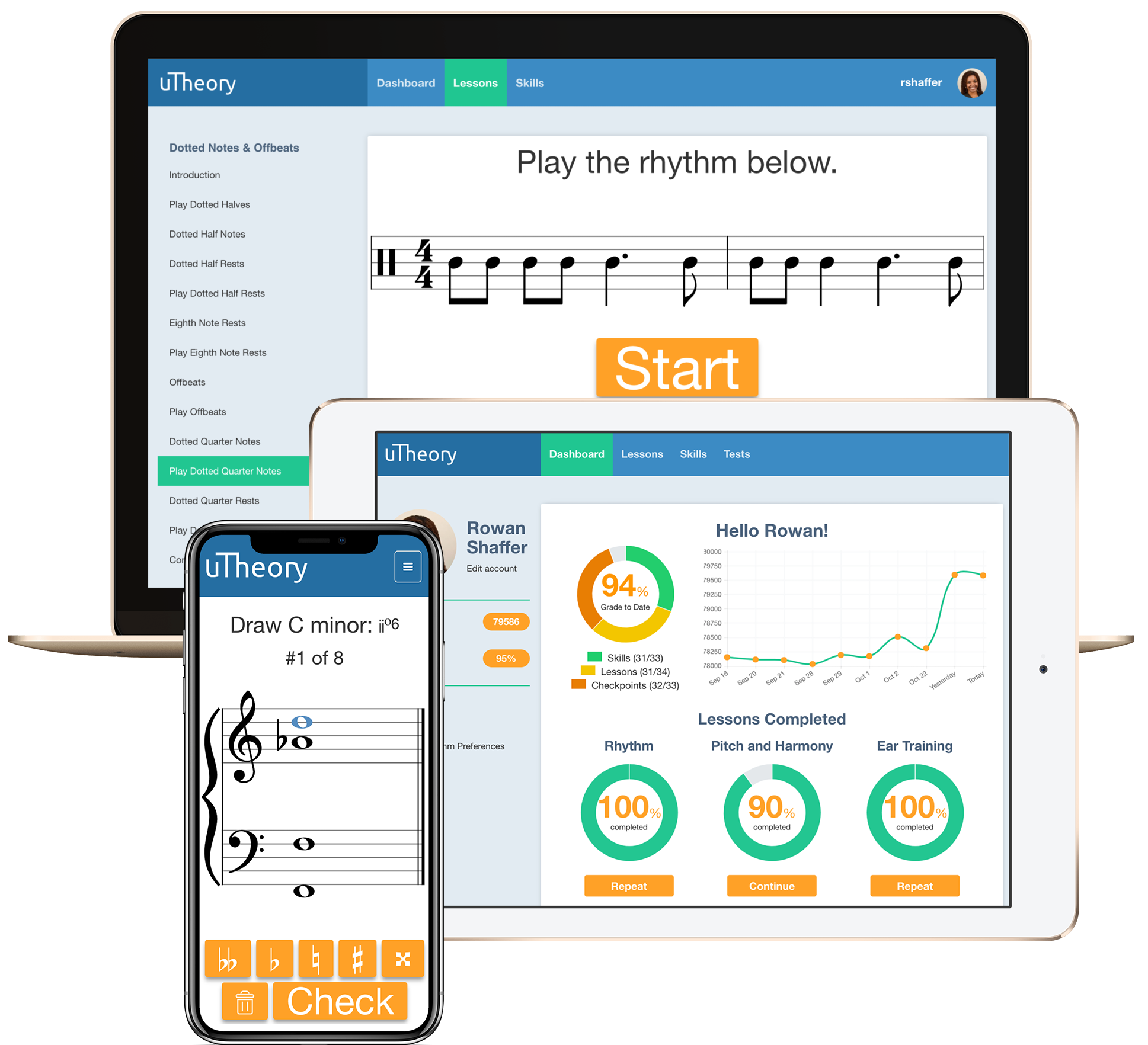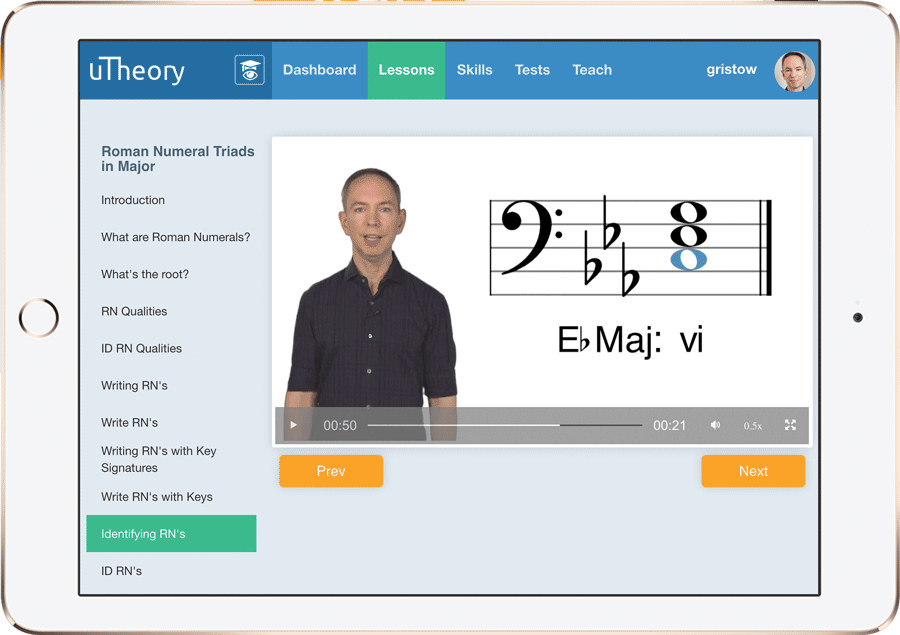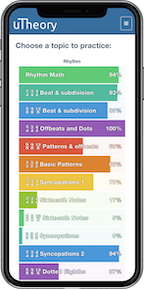uTheory is a mastery-based online learning platform for music theory. Through video lessons, individualized practice, and proficiency testing, uTheory has helped thousands of students around the world learn the fundamentals of music theory, rhythm and ear training. It's trusted and used at top high schools, middle schools and colleges, including Columbia University, Baylor University and the Oberlin Conservatory.
uTheory is fully cloud-based, and runs in a web browser on a computer, chromebook, phone or tablet, with no software or app to install. Whether your school has a one-to-one, bring-your-own-device or computer-lab approach to technology, uTheory will just work.

Lessons
Can technology match the experience of being in a classroom with a great music theory teacher? This question has guided every stage of uTheory's development.
Through videos and interactive exercises, uTheory creates the constant learn it–practice it–develop it loop that we see in the very best teaching.
We start with a great teacher. Dr. Gregory Ristow has more than twenty years' experience teaching theory for high school, community college, university and conservatory students, currently at Interlochen Arts Camp and the Oberlin Conservatory. His writings on teaching music theory have appeared in numerous publications, including the Journal of Music Theory Pedagogy. Meet the rest of our team of educators here.

Then we build a huge variety of activities, literally hundreds, to replicate what happens in face-to-face teaching and to give students immediate feedback. We guide struggling students with hints so they learn to find the right answer.
And, we give students motivation, showing them how their work is translating into mastery of skills.
We connect concepts to sound, providing high quality audio feedback for every question and exercise in uTheory.
As a teacher you can configure what lessons are required, optional or hidden from students. You can set due dates, see your students' progress, and you can choose your preferred solfege system so that all of the videos and exercises will use the language you use with your students.
Practice for Mastery
Music theory, rhythm and ear training require repetition to build intuition and fluency. Basic concepts must become easy and automatic so students can thrive with more advanced material.
uTheory's learning system is built around a detailed graph, representing the interdependency of many component learning objectives. Whenever a student answers a question, uTheory studies their answer, its speed and a record of all of their previous answers to update this graph and predict whether a student has mastered a topic. Students see their progress towards mastery as an animation showing their growth along the path towards 100%.

uTheory individualizes learning using this graph to provide specific exercises and questions tailored to each individual student, delivering the questions we believe a student is becoming ready to answer and those questions that are due for review.
As a teacher, you can see students' progress towards each skill, and even drill down to view each of the hundreds of component skills uTheory tracks. You can configure which skills to include or exclude from students' practice sessions.
Proficiency Testing
Proficiency tests, or 'checkpoints,' appear after several lessons, to let students experience answering questions with the training wheels off. In checkpoint tests students only receive feedback after they've completed the entire test, and we even disable audio feedback to simulate the challenge of taking a music theory test in silence.
As a teacher, you can configure whether checkpoints are required, optional or hidden. You can configure a mandatory score for passing, how many times a student can attempt a checkpoint (the test rewrites itself each time it is taken), and you whether a student should be allowed to move on to advanced topics if they haven't passed a checkpoint.
Although we believe uTheory's knowledge of a student's skill mastery is a more accurate measure of abilities than a single test, we have found that students enjoy the challenge and reward of passing checkpoint tests.
With an optional testing license, you can even create tests of your own and choose the kinds of questions and time limits for questions. Many colleges are using this feature for creating customized music theory placement tests for their auditioning and incoming students.
How Are Schools Using uTheory?
uTheory is being used in middle schools, high schools, colleges and conservatories around the world. We've tried to make it as flexible as possible so that you can incorporate it in your own teaching however it feels natural to you. But here are some of the most popular ways we've seen it being used.
- As a flipped classroom approach: students complete a lesson on their own before a class, rehearsal or lesson. That frees you up to use your time with the students to clear up any misunderstandings and give students more practice.
- As a fully self-guided resource for students: maybe you have a large choir with students at different levels, and very little time to teach music theory in class. You can assign students to spend a certain amount of time on uTheory (which you can track as a teacher), allowing each to progress at their own speed.
- As a self-contained online course in music fundamentals: Many colleges and universities who offer an introduction to music theory fundamentals online, or a music rudiments course for music majors who aren't yet ready for Music Theory I, are using uTheory as a self-contained course. As a teacher, you can configure uTheory to grade students based on a balance of lesson completion, skills and checkpoint tests, and decide whether that grade is visible to students.
- For placement testing: uTheory has an advanced optional custom tests module that allows schools to create placement tests that give students the opportunity to learn any areas they don't already know and retake the test. This has cut down the number of students needing music theory remediation, a major factor for student success in collegiate music programs.
uTheory gives you a suite of tools to keep track of how students are doing so that you can give them individualized help and feedback.
Get Started
Sign up for a free teacher's account at https://utheory.com/teach or read more at https://info.utheory.com